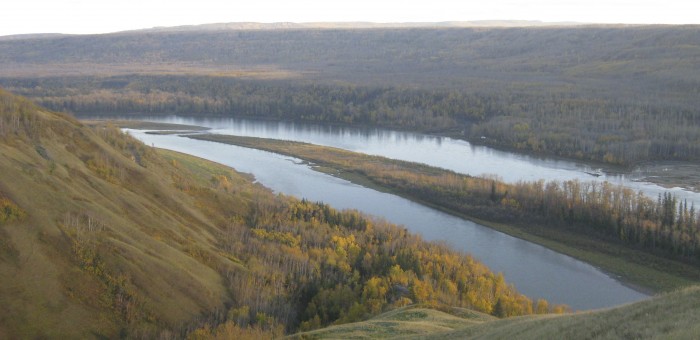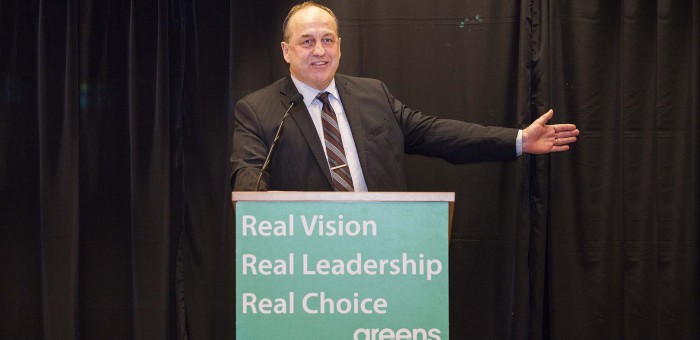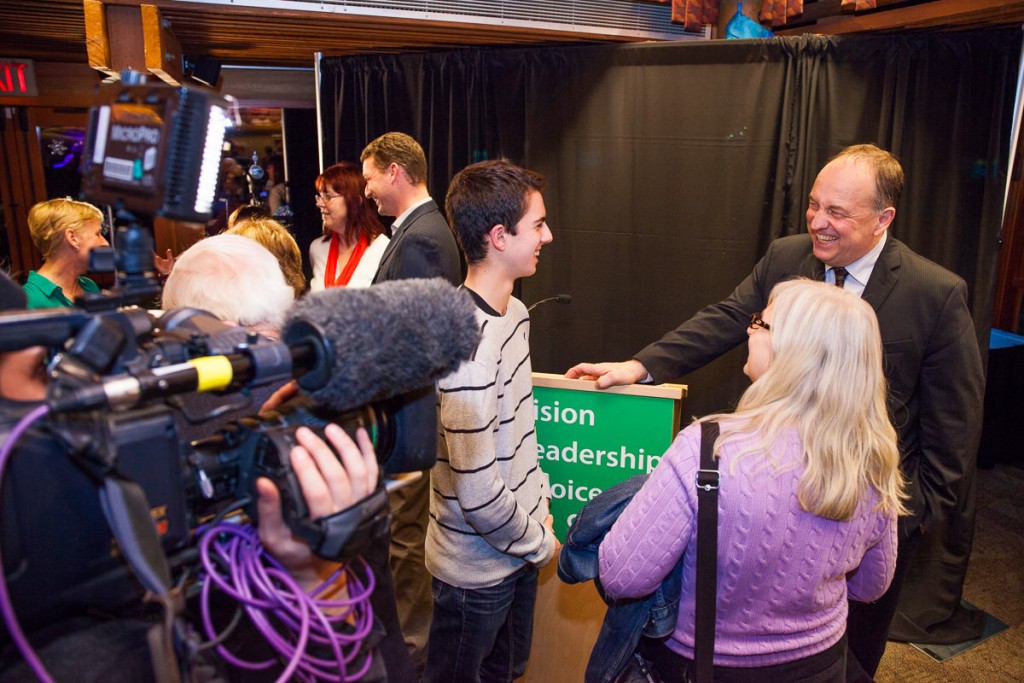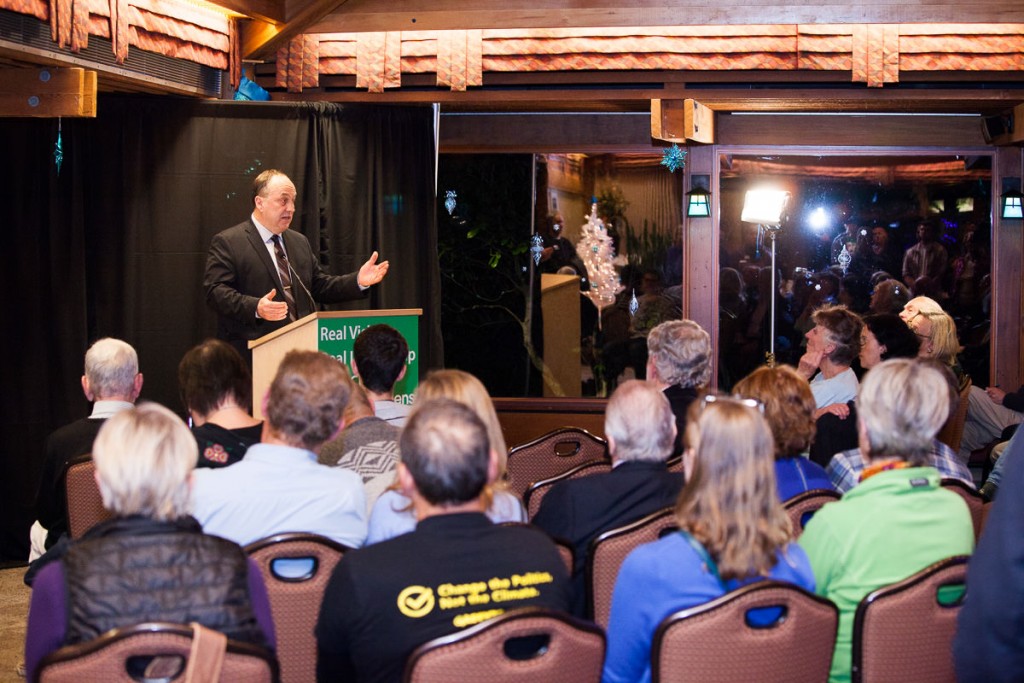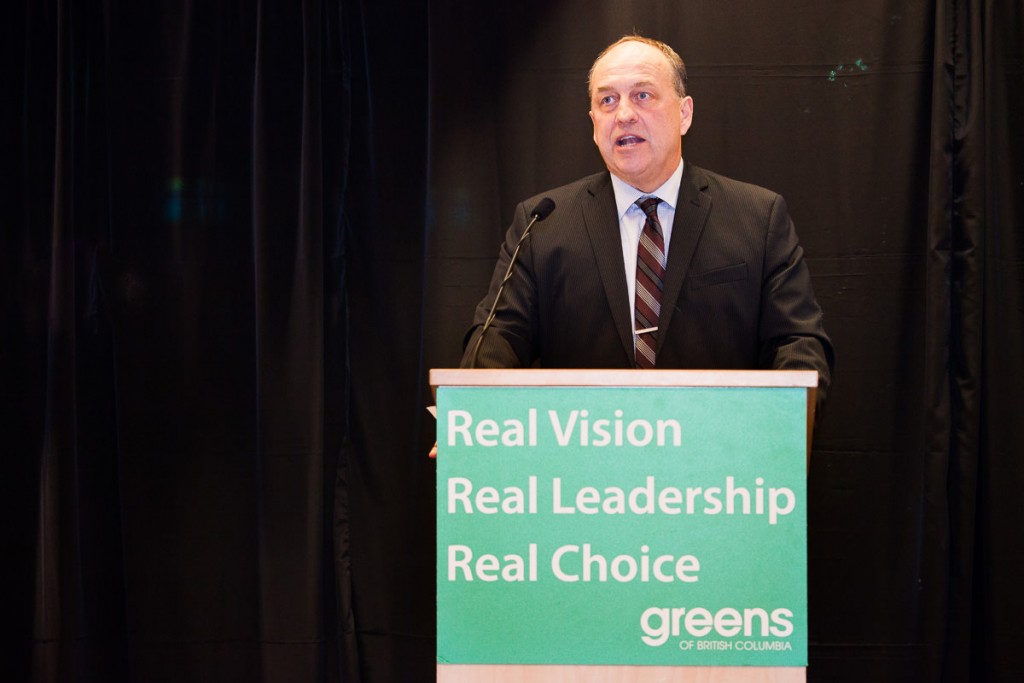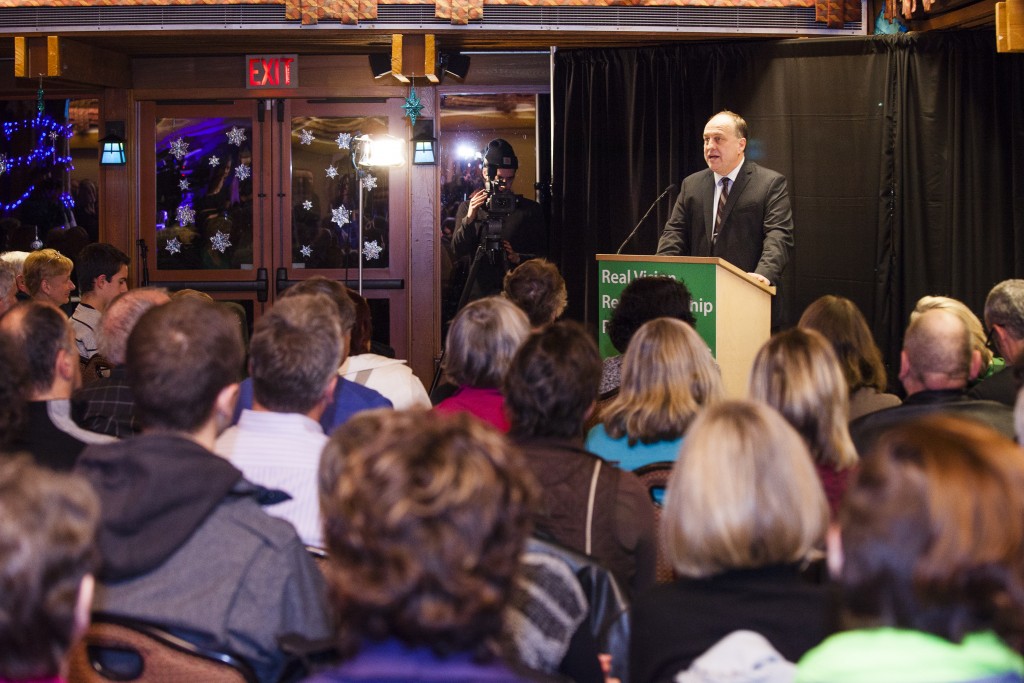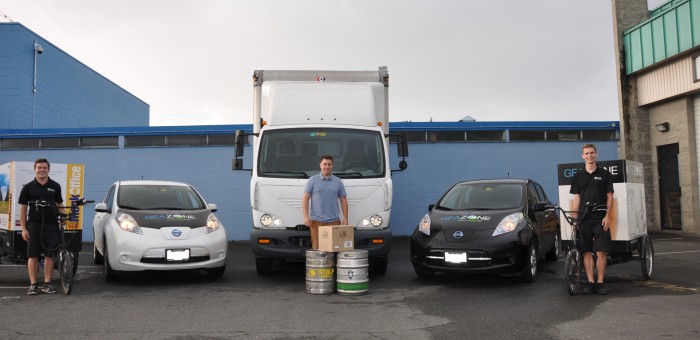Clean Technology
Calling for a halt to Site C activities
Media Release: February 18, 2016
Andrew Weaver calls for a halt to Site C activities
For Immediate Release
Victoria, B.C. – Citing significant risk to taxpayers and the provincial economy, Andrew Weaver, Leader of the B.C. Green Party and MLA for Oak Bay-Gordon Head, is calling for an absolute halt to Site C activities until the Auditor General’s report is completed.
“What do I think of Site C?,” says Weaver “It is risky and foolish. British Columbians are going to be paying for this project for decades, for a project that, in the absence of a vastly expanded LNG industry, we simply don’t need.”
On Monday B.C. Hydro will be in Vancouver seeking an injunction to remove a protest camp that has been set up by First Nations and landowners on the bank of the Peace River.
“Site C is a project that has been pushed forward from day one with exemptions on oversight every step of the way,” says Weaver. “The government has done everything it can to push aside dissent without reasonable justification. This latest move by B.C. Hydro is just another example of this approach.”
“Site C should have been subject to the B.C. Utilities Commision, but the government felt it would slow down their political agenda too much,” says Weaver.“I couldn’t agree more with former B.C. Hydro CEO Marc Eliesen in that due diligence is absolutely needed with a project of this magnitude. It’s simply reckless to proceed in this manner.”
Weaver warns that proceeding with Site C is also actively driving clean energy investment out of the province.
“Just two weeks ago the Canadian Wind Energy Association announced it was closing its office and leaving the province because the government and B.C. Hydro are just not interested,” says Weaver. “This mirrors a trend we saw last year with EDP Renewables – no interest from government for a roughly one billion dollar wind-power investment off Southern Vancouver Island, so the company walked.”
“Rather than let the market take the risk for energy infrastructure projects, this government is using billions of taxpayer dollars to get Site C ‘past the point of no return’. It’s a project that was dreamt up to support the pipedream of LNG. Now it’s a project without a home, and all we’ve seen is the cost go up and up while other opportunities vanish.”
Today in his response to the budget, Weaver elaborated on his fiscal concerns about Site C.
-30-
Media Contact
Mat Wright – Press Secretary Andrew Weaver MLA
1 250 216 3382
mat.wright@leg.bc.ca
COP21 Targets Require Ambitious Policy
Media Statement December 14, 2015
COP21 Targets Require Ambitious Policy
For immediate release
Victoria B.C. – Andrew Weaver, MLA for Oak Bay – Gordon Head and Leader of the B.C. Green Party welcomes the Paris climate agreement but cautions that it is only a first step towards reducing global greenhouse gas emissions.
The COP21 accord is non-binding and is designed to keep global temperatures to well below 2°C above preindustrial levels. “The world has already warmed by about 1°C and existing atmospheric carbon dioxide levels commit us to a further 0.6°C,” notes Weaver. “When you add in an additional warming of between 0.2 and 0.3°C from the permafrost carbon feedback, it makes it imperative that nations put forward far more aggressive greenhouse gas reduction targets than have been offered to date. The existing voluntary national targets make it virtually certain that 2°C warming will be broken this century.”
While the agreement includes all 195 nations and has legally binding provisions for the five year review, the targets are still voluntary and lack the policy measures needed to achieve the collective goal. Furthermore, until the World Trade Organization is part of the negotiations, it will be very difficult for any nation to enact policies that account for discrepancies in transjurisdictional emissions. “Countries that aggressively act to reduce emissions through carbon pricing need the ability to apply carbon tariffs on imports from jurisdictions that don’t,” adds Weaver.
“I am cautiously optimistic” said Andrew Weaver, “all countries have agreed to reduce emissions. In addition, developed nations have agreed to assist developing nations in adapting to a changing climate and to facilitate the transfer of clean technology.”
Andrew Weaver further notes that “For Canada to be recognized as a climate leader British Columbia must be part of the solution. We have an enormous opportunity in B.C. to invest in renewable energy such as solar, wind, and geothermal, as well as to further advance these sectors and globally export technology and expertise.”
British Columbia has the opportunity to harness natural resources, a nascent and growing clean tech sector, and skilled workers ready to accept the challenge. The current government, however, is actively heading the opposite direction by continuing to support high carbon industries like LNG and thermal coal. They have already stated they will not meet the mandated 2020 targets and the assurance by Premier Clark that LNG exports will somehow offset growing provincial greenhouse gas emissions is completely misguided.
“Ambitious targets require ambitious policy,” said Andrew Weaver. “To achieve a national transition to a low carbon economy our policies, political support, and subsidies need to shift away from backing the fossil fuel industry and start actively encouraging the clean technology sector.”
Media Enquiries
Mat Wright
Press Secretary – Andrew Weaver MLA
1 250 216 3382
mat.wright@leg.bc.ca
Leadership of the BC Green Party
At the UVic University Club on November 24, 2015 I formally announced my intention to seek the leadership of the BC Green Party. And on December 7, 2015 I was elected by acclamation as our new leader. Below is the text of the speech that I gave at the announcement. In the speech I outlined the reasons why I sought the leadership and I offered a vision for a prosperous future for all British Columbians.
Introduction
Thank you Elizabeth. You’ve been an absolute inspiration to me. And I am honoured that you were able to make it to tonight’s event knowing that you will be heading to the COP21 meeting in Paris imminently.
I’m also very grateful to Claire Martin for coming over from Vancouver to act as our MC. I know that she’s also off to COP21 shortly. And I am especially grateful to Butch Dick from the Songhees nation for welcoming us tonight.
Finally, this event tonight would never have happened if it weren’t for the efforts of the incredible group of individuals that I have the honour of working with: Judy Fainstein, Mat Wright, Evan Pivnick and Karin Lenger along with all of the volunteers. Thank you.
It’s humbling for me to see so many people here. I sincerely appreciate you all joining me this evening and I look forward to answering your questions and chatting with you one on one afterwards.
The University Club in which we stand has a special meaning to me. It first opened in 1967 in the old army hut that stands today as E-Hut. I remember as a little boy being taken by my parents to visit Santa at the annual Christmas parties, including the very first one they hosted. Over the years I’ve had many dinners and attended countless functions in the old E-Hut facility. And in 1982, when Phase II of the University Club was completed — the building we are in now — I had just started my final year of undergraduate studies.
I left Victoria in 1983 and it wasn’t until 1992 that Helen and I returned to our hometown. As a young faculty member I joined the newly created School of Earth and Ocean Sciences, appropriately located in E-Hut, the former location of the University Club. In 1992, if someone would have told me that I would be standing in the University Club as the elected BC Green Party MLA for Oak Bay Gordon Head, I would have thought they were crazy.
I was a scientist. I was a teacher and I had no interest in politics.
Yet two decades later, in the fall of 2012, Jane Sterk, after a number of previous attempts finally convinced me to run in the May 2013 provincial election.
I had spent many years understanding the basic physics of the past, present and future climate system. It became evident that global warming was emerging as the defining challenge of our time, and that there were enormous opportunities available to those jurisdictions that were first to act boldly in transitioning to a low carbon economy.
I advised governments at all levels on available policies that could allow them to seize those opportunities. And I saw British Columbia begin to show leadership by doing just that.
But as the government then shifted all of its efforts, and all of its hopes, to the LNG pipedream, I saw us lose that leadership. I watched as we went from leaders in developing a 21st century economy, to laggards, scurrying back to the 20th century, hoping for an out-dated and unrealistic LNG windfall. For three years now I’ve been saying the same thing. The economics simply does not work for BC to build a thriving LNG industry any time soon.
As I watched our provincial leadership unravel, I was reminded of something I would tell my students. If you want your government to show leadership on the issues that you care about, I would tell them that you need to elect people who will act on your concerns. Or, if you feel like none of the candidates is seriously addressing the issues you are worried about, you should consider running for office yourself.
Ultimately, I decided that I needed to take my own advice. I ran for office because I saw an opportunity to help build a vision that would put our province on a path of developing a 21st century diverse and sustainable economy. Now, after 2 1/2 years in office, it’s clear to me that this is more important than ever.
In the shadows of the massive challenges that we face, our province needs new leadership.
Leadership that offers a realistic and achievable vision grounded in hope and real change.
Leadership that places the interests of the people of British Columbia — not vested union or corporate interests— first and foremost in decision-making. And it’s not only today’s British Columbians that we must think about, it’s also the next generation who are not part of today’s decision-making process.
Leadership that will build our economy on the unique competitive advantages British Columbia possesses, not chase the economy of yesteryear by mirroring the failed strategies of struggling economies.
Leadership that will act boldly and deliberately to transition us to 21st century economy that is diversified and sustainable.
Leadership that doesn’t wait for public opinion — but rather builds it.
It’s clearer to me now than ever before. The province needs new leadership bringing new ideas, new direction and new people to the legislature. For too many decades British Columbia has had to put up with our two-party dichotomy of dysfunction.
On the left there’s the BC NDP. Frankly there’s nothing new or anything particularly democratic about the BC NDP. On the right we have the BC Liberals. And there is absolutely nothing liberal about the BC Liberals.
Too often British Columbians vote for the BC Liberals not because they like what they stand for, but rather because they dislike what the BC NDP stand for. Too often British Columbians vote for the BC NDP not because they like what they stand for, but rather because they dislike what the BC Liberals stand for. And therein lies our opportunity.
The BC Greens will offer British Columbians candidates, ideas and policy that they can vote for, instead of vote against. It’s time for us to create a third viable option.
And so, with the knowledge of the opportunities and challenges that lie ahead, I announce my candidacy for the Leadership of the BC Green Party.
To an Economic Vision for the 21st Century
We have a unique opportunity in British Columbia to be at the cutting edge in the development of a 21st century economy.
Our high quality of life and beautiful natural environment attract some of the best and brightest from around the globe —we are a destination of choice. Our high school students are consistently top ranked — with the OECD specifying BC as one of the smartest academic jurisdictions in the world. And we have incredible potential to a create clean, renewable energy sector to sustain our growing economy. When we speak about developing a 21st century economy — one that is innovative, resilient, diverse, and sustainable — these are unique strengths we should be leveraging.
Unfortunately, instead of investing in a 21st Century economy, our government has banked all its hopes on an irresponsible, unrealistic fossil fuel windfall, with its Liquefied Natural Gas sector. We are already seeing these promises unravel as we chase a falling stock, doubling down on the way.
A 21st century economy is sustainable — environmentally, socially and financially. We should be investing in up-and-coming sectors like the clean tech sector, and creative economy that create well-paying, stable long-term, local jobs and that grow our economy without sacrificing our environment.
We should be using our strategic advantage as a destination of choice to attract industry to BC in highly mobile sectors that have difficulty retaining employees in a competitive marketplace. We should be using our boundless renewable energy resources to attract industry that wants to brand itself as sustainable over its entire business cycle, just like Washington and Oregon have done. We should be setting up seed funding mechanisms to allow the BC-based creative economy sector to leverage venture capital from other jurisdictions to our province. Too often the only leveraging that is done is the shutting down of BC-based offices and opening of offices in the Silicon Valley.
We should fundamentally change the mandate of BC Hydro. BC Hydro should no longer be the builder of new power capacity. Rather, it should be the broker of power deals, transmitter of electricity, and leveller of power load through improving British Columbia power storage capacity. Let industry risk their capital, not taxpayer capital, and let the market respond to demands of cheap power.
Similarly, by steadily increasing emissions pricing, we can send a signal to the market that incentivises innovation and the transition to a low carbon economy. The funding could be transferred to municipalities across the province so that they might have the resources to deal with their aging infrastructure and growing transportation barriers.
By investing in the replacement of aging infrastructure in communities throughout the province we stimulate local economies and create jobs. By moving to this polluter-pays model of revenue generation for municipalities, we reduce the burden on regressive property taxes. Done right, this model would lead to municipalities actually reducing property taxes, thereby benefitting home owners, fixed-income seniors, landlords and their tenants.
Yes, we should be investing in trade skills, as described, for example, under the B.C. jobs plan. But we should also be investing further in education for 21st century industries like biotech, high tech and clean tech. It’s critical that we bring the typically urban-based tech and rural-based resource sectors together. Innovation in technology will lead to more efficient and clever ways of operating in the mining and forestry industries. Just last week, for instance, I was told the story of a BC-based technology innovator partnering with a local mine to dramatically improve the efficiency and environmental footprint of their mining operations. Rather than hauling thousands of unnecessary tonnes of rock to a crusher for processing, the new technology allowed the rocks to be scanned for gold content on site. This meant that prior to trucking, the company could determine if it was more cost-effective to simply put the rock to one side for use as fill later.
Natural gas has an important role to play. But, we should use it to build our domestic market and explore options around using it to power local transport. BC businesses such as Westport Innovations and Vedder Transport have already positioned British Columbia as an innovative global leader in this area.
We should be investing in innovation in the aquaculture industry, like the land-based technologies used by the Namgis First Nation on Vancouver Island who raise Atlantic salmon without compromising wild stocks.
The logging industry is booming yet we send record amounts of unprocessed logs overseas. Now is the time to retool mills to foster a value-added second growth forestry industry.
These are just a few ideas that could help us move to the cutting edge in 21st the century economy.
Fundamental to all of these ideas is the need to ensure that economic opportunities are done in partnership with First Nations. And that means working with First Nations through all stages of resource project development – from conception to completion.
To the issue of Affordability
A 21st century economy must also be an affordable one.
Right now, over half a million British Columbians are currently living in poverty. Today’s report issued by the BC Child and Youth Advocacy coalition noted that one in five children overall in BC live in poverty. More than 50% of children in single-parent families live in poverty. This is unacceptable.
The government responds to these facts with the same old mantra: It can’t do more until the economy grows. Yet, we hear year after year from the government that the economy is growing. The fact is, we have seen growth, we have money to invest, and we know that if we invest capital smartly we will actually save in operating costs. So let me offer just one or two ideas of where we should start:
Let’s fix the Registered Disability Savings Plans and Registered Educational Savings Plans. Currently, RDSPs and RESPs do not receive the same protection that RRSPs and RRIFs do when a family or individual is faced with bankruptcy. This means that when faced with bankruptcy, these already vulnerable individuals lose the one thing that would otherwise provide a glimmer of hope for a financially stable future. By simply providing creditor protection for disabled individuals and children’s education funds we can make the pathway out of poverty that much easier for those individuals experiencing bankruptcy. And let me be clear: This is a policy change—it doesn’t cost anything.
At the same time we know from other jurisdictions, that by providing chronically homeless individuals with a home through Housing First Policies, we not only provide individuals with a basic human right — shelter — but also better health outcomes, all while realizing long-term, overall net savings to government.
Medicine Hat saw a 26% decrease in emergency shelter use in just four years and has housed over 800 people, including over 200 children. Utah has reduced chronic homelessness by 72% as of 2014. A housing first pilot project in Denver, Colorado found emergency related costs and incarceration costs declined by 72.95% and 76% respectively, while emergency shelter costs were reduced by an average of $13,600 per person. Canada’s own At Home/Chez Soi study found that for every $10 invested in housing first services there was an average savings of $21.72.
And we need to deal with rampant speculation in our housing market. Simple steps like closing the Bare Trust Loophole would be effective. Or, as I introduced in a private members bill earlier this year, providing government the means of determining who is purchasing property in B.C. This includes determining both foreign investment flows, the role that corporations are playing in purchasing property and if we have significant speculation coming from other places in Canada.
The solutions to our province’s affordability crisis are out there, and those solutions themselves are affordable. We just need to invest in them. Given everything we know, the question becomes this: how can we afford not to?
To the issue of Health Care
The need for affordability must extend to quality health care too.
We can be proud that B.C. was recently ranked the healthiest province in Canada. This ranking shines a positive light on the healthy lifestyle choices British Columbians make each day. Yet, while we celebrate our successes, we must also remember that our health care system faces serious challenges.
With a highly regressive health care funding system, an aging population, major gaps in primary care, and surgery waitlists lasting anywhere from months to years, it is time for government to take a serious look at how our Health Care System is funded and administered.
British Columbia is the only province in Canada that continues to charge MSP premiums. Such premiums unfairly burden low and fixed income British Columbians with an overly heavy tax burden. With individuals earning a net annual income of $30,000 paying the same monthly flat fee as those earning $3,000,000 per year, it is evident that MSP premiums are perhaps the most regressive form of taxation in B.C.
Instead of charging MSP premiums, we should look at shifting to alternative, more progressive options such as was done in Ontario and Quebec. Rather than flat-rate fees, health premiums can be paid through the personal income tax systems. This avoids the regressive effects of flat-rate premiums and diminishes the additional costs associated with administering the MSP program.
But it can’t stop there. We also need to address the growing gaps in primary care. Doctor shortages and long wait times to get an appointment have led to increased use of walk-in clinics and emergency room services. Unfortunately, this can be costly for both patients and our health system, as a lack of follow-up and co-ordination can mean problems are missed or poorly managed.
Let’s look at investing more in Nurse Practitioners to help close some of these gaps and provide the high quality and timely care that British Columbians pay for and need. Let’s find more effective ways of funding these Nurse Practitioners. Let’s re-examine our approach to the delivery of chronic care services. Relying on acute care services, such as walk-in clinics and hospital emergency rooms, to deal with chronic health issues is both costly and inefficient.
Let’s consider increasing community and at-home care programs, which have been shown to provide better care at a more affordable cost. And let’s lobby the Federal government for our fair share of Canadian Health Transfer revenue, a share that reflects our demographics and the actual cost of delivering health services.
The possibilities for improving our health care system are plenty. As our population continues to age and gaps in primary health care continue to grow, it is more important now than ever to commit to re-examining how we provide affordable, quality health care in B.C.
To the issue of Education
Public education represents perhaps the most important investment government can make for the prosperity of our province. Each and every one of us has attended school and that experience has shaped who we are, what we do and how we contribute to society. And public education is absolutely critical in teaching the next generation of British Columbians to think critically, contribute responsibly to society, and become the leaders of tomorrow.
Given this, why have we not shown more leadership in the Education sector?
At the end of the strike last year, the government spoke about “an historic six-year agreement…which means five years of labour peace ahead of us.”
The implication of this sound bite is NOT that government is stepping up to the task of finding new ways to fund and deliver a leading public education system. The reality is that they are stepping back, allowing their dysfunctional relationship with teachers to simmer, only to boil over again in a few years.
We are stepping back despite an overall 18% and a whopping 44% aboriginal six-year high school non-completion rate. We have school boards at a loss for how to fund their operations due to seemingly endless budget cuts. Surely this is not indicative of a government properly valuing publication education.
It is time for the government to take leadership.
Leadership means ensuring that the resources needed for success are provided. Over the last 13 years, education funding as a percentage of provincial GDP has declined from a high of about 6.4% to an estimated low of about 5.0%. This is not indicative of a government that is prioritizing education. We need to find new, progressive funding sources to reinvest in education.
Leadership means acknowledging that behind the curtain of the BC Public School Employers’ Association is the provincial government. Yet it is the government, not BCPSEA, that draws the lines in the sand on funding. By dismantling the BCSPEA and bringing its operations back into government, a signal could be sent that government is serious in developing a new relationship with teachers.
Leadership also requires a clear eyed assessment of what’s working, and what isn’t – and clearly a ‘one size fits all’ approach isn’t working. The needs on Haida Gwaii, are different from those on Vancouver Island which in turn are different from those in Surrey or Prince George. Now is the time to explore whether or not class size and composition negotiations are better conducted at the school district level instead of the provincial level.
The status quo on education isn’t addressing the growing challenges. We cannot wait until the next labour dispute. Now is the time to sit down with stakeholders and start a dialogue about what a 21st century education system looks like, including how it is funded.
To the issue of Leadership
Our present provincial political leaders seem to have forgotten the essential traits of a successful leader: being principled, honest, authentic, trustworthy and having integrity. Our political leaders must have the courage to be honest with British Columbians about the risks and consequences of any government decision. Honest about the consequences of reckless hyperbole of government promises.
Perhaps the most striking illustration of the lack of honesty in BC’s political discourse has to do with LNG. In the lead-up to the last election, British Columbians were sold a bill of goods by this government. The promise of 100,000 jobs, a $100 billion prosperity fund, a $1 trillion hit to GDP, a debt-free B.C. and on and on.
This government has spent the last three years touting B.C.’s imminent LNG industrial boom. They sent a signal to the market that if industry wanted to do business in B.C., it had better have something to do with LNG. Yet BC’s venture into LNG has been a monumental failure.
The undeniable truth is that British Columbians were sold a bill of goods in that last election that will not come to pass.
Unfortunately it is British Columbians who will bear the consequences of the BC Liberal decisions.
The government’s all in approach on LNG has seen us lose our place of leadership in developing a 21st century economy.
But it’s not too late to reverse this. What we need is a renewed commitment to evidence-based decision making, and a government that is honest with its citizens.
Leadership builds public opinion – it doesn’t follow it. We need politicians who put the good of the province ahead of the good of the party.
This is the type of leadership that is absent from both the BC LIberals and the BC NDP. The BC Liberals will tell you whatever it takes to win. The BC NDP take positions based on what the BC Liberals do, rather than on what the evidence tells us. They try to be all thinks to all people and hence are paralysed by the decision-making process.
One only needs to sit in the legislature for a single debate to see that positions are taken based on the politics of an issue, rather than the evidence behind it.
British Columbians expect more than this. They want to see government acting to help all British Columbians – not merely those who voted – or funded them. This means an honest and open commitment to seek out perspectives and ideas of others and evaluate them based on their merit. Not their source.
To the issue of Choice
There is a choice that we will face in 2017. Another four years of the same old, same old politics as usual that has been working for far too long against the interests of British Columbians, or a new approach to politics that will focus on putting the interests of British Columbians first.
The BC Green Party is the only party that will offer British Columbians a real choice and a real vision for the province. We will offer real leadership with new candidates who run to put British Columbians first and break down the dysfunctional cycle of partisan politics that has dominated British Columbia for far too long.
It will take all of us to bring this vision forward. We have a lot of hard work ahead of us.
But together we will build a prosperous future for all British Columbians.
Thank you everyone for coming tonight and I look forward to your support in the lead up to the 2017 provincial election.
CBC Radio Interview Shortly Before the Event
The Monumental Failure of BC Liberal’s LNG Hyperbole — What’s Plan B?
Today in the legislature during Question Period I rose to quiz the government on its irresponsible and misleading claims concerning our LNG potential. I’ve been pointing out the same thing for three years. An LNG industry in BC is not going to be an economic reality any time soon — the numbers just don’t add up. Yet during this time the BC Liberals have given us three years of hot air and broken promises. Franky, the LNG Emperor has no clothes and it’s time that British Columbians are told the truth.
As I pointed out two weeks ago, Goldman Sachs has forecast a 13 percent drop in LNG prices in 2017 and a further 23 percent drop by 2018. And the U.S. starts shipping LNG in January of 2016. The forecast spot price in Japan is $6.13 in 2016, compared to $7.49 now. Goldman Sachs has projected a $5.19 spot price for landed LNG in Japan in 2017 and a $4.75 spot price in Japan for 2018. It’s looking more and more like British Columbianas will have to literally pay people to take our gas.
During Question Period, I posed two questions to the Minister of Natural Gas Development. Frankly, in my view, his answers were shocking. But I will let you be the judge.
As a direct response to the absurd responses I received, immediately after question period I stood and moved that the house proceed to an emergency debate pursuant to Standing Order 35 on a plan for B.C.’s economy in light of the monumental failure of this government’s plan for LNG and the urgent need to transition to a low-carbon economy. I am grateful for the support of the BC NDP in my attempt to stimulate such a debate. The government argued such a debate was not needed and in the end, the speaker ruled on the side of the government.
Below I reproduce the Question Period exchange. I also provide the video and text of the discussions as to whether or not we should have the emergency debate.
Video of Question Period Exchange
Question
A. Weaver: In the lead-up to the last election, British Columbians were sold a bill of goods by this government. The promise of 100,000 jobs, a $100 billion prosperity fund, a $1 trillion hit to GDP, a debt-free B.C. and on and on.
This government has spent the last three years touting B.C.’s imminent LNG industrial boom. They sent a signal to the market that if industry wanted to do business in B.C., it had better have something to do with LNG.
We were summoned for an urgent summer session of the Legislature to debate the project development agreement for Petronas’ LNG proposal, yet the months continue to pass. The global market supply of gas gets bigger and bigger. Company after company move on to other jurisdictions, and this government remains silent about a plan B.
My question to the minister is this: given the monumental failure of this government’s plans for LNG, what is plan B for the B.C. economy?
Answer
Hon. R. Coleman: I’ve only got two minutes?
Madame Speaker: Please proceed.
Hon. R. Coleman: The only monumental failure in this House is that member’s inability to understand how important natural gas could be to the GHGs in the world sent from British Columbia.
Let’s give the member a little recap. We have a conditional FID. We have a project development agreement and one major project in Prince Rupert. We have environmental assessment certificates on three or four additional projects. We have 20 proposals in British Columbia for LNG, opportunities in B.C. Just yesterday, hon. Member, I was at Tilbury where they’re actually building a tank and expanding the Tilbury operation for Fortis for LNG to go into places like Hawaii. At the same time….
I know the member has an issue with First Nations having opportunities and changing their lives and the opportunity of a generation about LNG. But just yesterday the Tsawwassen First Nation announced that they’re going to do a referendum on accepting a proposal from a company, Mitsui, to put an LNG plant on their property in Tsawwassen for the future of their community.
We have 28 pipeline benefit agreements across the north for communities of First Nations, who will see an opportunity for trades, opportunities and a change in the lives of their young people, an opportunity for jobs.
We are moving forward with LNG. I know it drives the member crazy but that’s the way it is, hon. Member.
Supplementary Question
A. Weaver: Well, I think we should change the name of the ministry to the ministry of gas and hot air, based on that speech.
In just two short weeks, leaders from around the world will descend on Paris to attend the 21st Conference of the Parties to the United Nations framework convention on climate change. Next week the Premier will attend a first ministers meeting in Ottawa to come up with a national strategy prior to Paris.
Yet our government’s promise of wealth and prosperity from a hypothetical LNG industry is entirely inconsistent with a B.C. — let alone a national — strategy to reduce green house gas emissions. What will the government do today to invest in B.C.’s economy in light of the monumental failure of its LNG plans and the urgent need to transform to a low-carbon economy consistent with international efforts?
Answer
Hon. R. Coleman: Maybe the member ought to do a little bit of research. I know he thinks he’s an expert on this, but maybe he should go to China and see just how bad the air is and know that the cleanest-burning fossil fuel in the world can actually change the lives and health outcomes for hundreds of millions of people.
If he did, he would recognize that the world needs a transition fuel to reduce pollution, reduce GHGs in the atmosphere, take the particulates out of the air, give people better health outcomes. At the same time, while doing that, help the economy in British Columbia to improve the lives Asia, by bringing LNG from British Columbia to Asia to help them deal with a significant problem — at the same time, getting the maximum benefit from a resource that British Columbians have every right to get the benefit from.
Text of Request for Emergency Debate
A. Weaver: Again, I rise pursuant to Standing Order 35. As advised in Standing Order 35, I gave the Chair advance notice, and I’ve provided a written statement of the matter proposed to the Clerk.
By leave, I move that the House do now adjourn to discuss a matter of urgent public importance — namely, a debate concerning an economic backup plan for British Columbia given the complete collapse of this government’s all-in strategy on LNG and the urgent need to transition to a low-carbon economy.
This government spent the last three years touting B.C.’s imminent LNG industrial boom. They sent a signal to the market that if you wanted to do business here in B.C., it had to be something to do with LNG. Clearly, not the signal that many sectors wanted to hear.
From the answers in question period, it’s clear that government has no plan B. It’s clear that they have no climate strategy. Frankly, it’s clear that they’re rudderless.
As legislators, we have a duty to the people of British Columbia to urgently turn our attention towards a debate for plan B for B.C.’s economy prior to next week’s first ministers’ meeting in Ottawa and the upcoming UNFCCC meeting in Paris.
As section 35 demands, there is no other time in this session to debate such a plan for B.C.’s economy in light of the monumental failure of this government’s plan for LNG and the urgent need to transition to a low-carbon economy.
Hon. M. de Jong: I’m also obliged to the member for having not only provided the Chair but having provided me with advanced copy of his comments, which I should say bear a striking similarity to his comments in question period. That is not altogether insignificant, because one of the issues….
I must say that I am sorely tempted, given the nature of the subject advanced, to suggest that the House accommodate the member. But I am obliged to point out that the rules governing the application of Standing Order 35 are very strict and very specific, and that is for good reason.
The urgency of debate and the opportunity for debate. The member has just indirectly alluded, on this particular issue, to the opportunity that has existed in this chamber to make submissions on this very point. He did so mere moments ago in his participation in question period.
His remarks provided me with the opportunity to go back and review what he had to say earlier in this chamber, in September, in a debate that took place around energy matters, and again, I applaud him for his consistency, and I point out that I remain unconvinced about his approach and his arguments.
Nonetheless, the more important feature is that there has been ample opportunity. It is the urgency of debate, not the urgency of the matter itself. For that reason alone, I would suggest that the member in his submission to the Chair has failed to make the case for invoking section 35.
M. Farnworth: Just following on the Government House Leader’s comments, I know when this issue was raised back earlier in the summer session, the official opposition indicated that it would be supportive of a debate around the climate change and the conference in Paris.
That still remains our position. So if it was the Speaker’s view that, in fact, the motion moved by the member from Oak Bay, we would be supportive of the ability to have that debate.
Video of Request for Emergency Debate
Celebrating Local Businesses in Our Community – Geazone
 A four-time Canadian National Downhill Mountain Bike champion, Geazone’s president and CEO Andrew Mitchell is used to taking risks and working fast. “In downhill racing you have to live in the future, anticipating and preparing for what is around every corner on the trail,” said Geazone’s director of sales and marketing Greg Parish. When it comes to business, it seems Andrew takes the same approach.
A four-time Canadian National Downhill Mountain Bike champion, Geazone’s president and CEO Andrew Mitchell is used to taking risks and working fast. “In downhill racing you have to live in the future, anticipating and preparing for what is around every corner on the trail,” said Geazone’s director of sales and marketing Greg Parish. When it comes to business, it seems Andrew takes the same approach.
Geazone is a zero-emission courier company that uses tricycles, electric cars, and 5-tonne electric trucks to do their deliveries. On a full charge, Geazone’s electric fleet can deliver goods from Victoria to Nanaimo, and everywhere in between, without emitting a single gram of greenhouse gases. They do a Victoria to Vancouver run too, taking beer into the city and stopping to pick up hops for Victoria breweries on the way back.
Geazone presently has 100 active clients, many of them breweries, including Lighthouse, Red Arrow, Saltspring Island Ales, Wolf Brewing Company, and Hoyne. “The local beer and wine sectors seem to be the ones going green first,” said Andrew of his clients.
 Over the course of this series it has been amazing to see so many B.C. entrepreneurs working together to support one another’s visions for business done better. When I met with Sean Hoyne, of Hoyne Brewing Company, he talked about how his brewery has partnered with Geazone to deliver their beer. “I like supporting Andrew because he is a young entrepreneur doing the right thing,” Sean told me. His praise was well deserved and wonderfully timed as I already had a meeting with Geazone booked for the following month.
Over the course of this series it has been amazing to see so many B.C. entrepreneurs working together to support one another’s visions for business done better. When I met with Sean Hoyne, of Hoyne Brewing Company, he talked about how his brewery has partnered with Geazone to deliver their beer. “I like supporting Andrew because he is a young entrepreneur doing the right thing,” Sean told me. His praise was well deserved and wonderfully timed as I already had a meeting with Geazone booked for the following month.
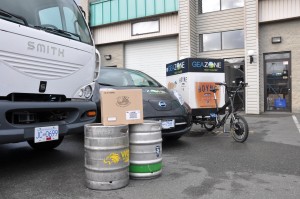 Geazone has doubled its growth every year since they opened for business in 2012. In just three years they have prevented over 100,000 kg of carbon emissions from entering the atmosphere and they don’t plan on slowing down anytime soon. Up next, they hope, is the addition of electric semi-trucks to their fleet (which can travel 160km/charge), a warehouse in Vancouver, and extra charging stations to broaden their range. “By the time people catch on we’ll be five years ahead,” said Greg.
Geazone has doubled its growth every year since they opened for business in 2012. In just three years they have prevented over 100,000 kg of carbon emissions from entering the atmosphere and they don’t plan on slowing down anytime soon. Up next, they hope, is the addition of electric semi-trucks to their fleet (which can travel 160km/charge), a warehouse in Vancouver, and extra charging stations to broaden their range. “By the time people catch on we’ll be five years ahead,” said Greg.
If Geazone replaced one of the semi-trucks delivering beer from Victoria to the British Columbia liquor distribution branch (BCLDB) in Vancouver with an electric model they would reduce carbon dioxide emissions on that route by roughly 37,000 kg per year.
Let’s take a look at the numbers:
- The round trip is about 140 km.
- The trucking industry vehicle fleets average 35-40 litres/100 km (so let’s choose 38).
- This means that on average a single round trip would use 140 km x (38 litres/100 km) = 53 litres of diesel (that would cost about $64 per trip at a price of $1.20 per litre).
- Now according to the US Energy Information Administration, 22.38 pounds of carbon dioxide are emitted during the combustion of one US gallon of diesel. This converts to 2.7 kg/litre.
- And so the average round trip in a diesel-powered truck would release 2.7 kg/litre x 53 litres = 143 kg of carbon dioxide emissions to the atmosphere.
- Now if we assume that only one trip can be made a day so that 260 trips occur each year with trucks operating only Monday through Friday, then in one year, 143 kg x 260 trips = 37,000 kg of carbon dioxide is emitted (and the annual cost of fuel would be $64 x 260 trips = $16,640).
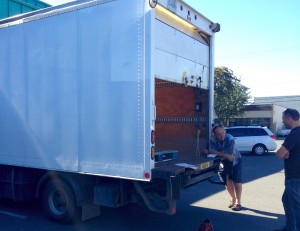
Cost-wise, their services are not more expensive than their diesel-reliant counterparts. If anything, Andrew said, they are more competitive than non-electric couriers because they don’t have to buy gas. Typical couriers will spend $80.00 or so on fuel per full day of deliveries; it costs Geazone $2.00 to charge up a Nissan Leaf for the day and $10.00 – $12.00 to charge their 5-ton trucks. Coming back to the numbers, the net annual operating savings on that return trip from Victoria to the BCLDB in Vancouver would be about $14,000 for a single truck.
That said, large courier companies do have the ability to undercut the market in a way Geazone cannot. But Andrew’s clients back him up, he said, and support Geazone because they believe in what he is doing.
The wider community in Victoria is getting on board too and the bike couriers are always a big hit at events and festivals, Andrew said. We found it amusing to learn that the Geazone team have been scolded on a few occasions by concerned citizens for leaving their trucks running while they load. “I told them it was electric but they didn’t believe me!” said Greg with a laugh. “I had to show them that the truck doesn’t even have an exhaust pipe — then they were impressed.”
Geazone is leading the way in BC with innovative zero-emission transport solutions. And at the same time, they’re saving money and creating job growth in the emerging 21st century economy.

